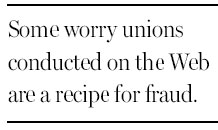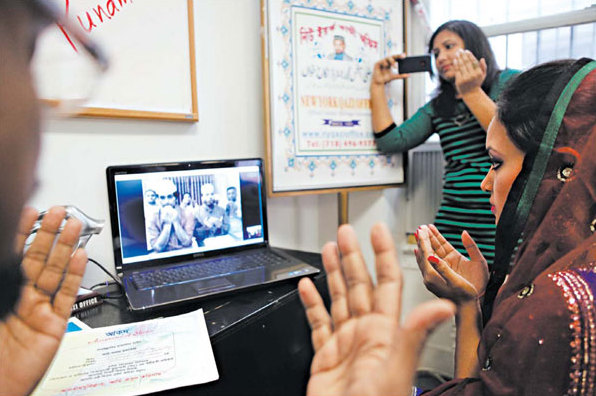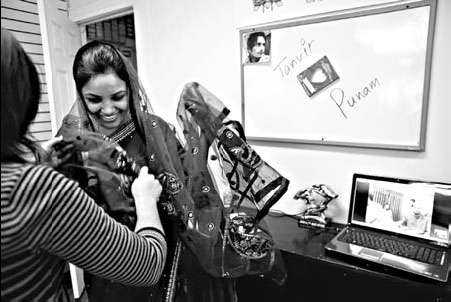Wed on the Internet
Updated: 2013-04-21 07:49
By Sarah Maslin Nir(The New York Times)
|
|||||||||
|
Vows are being exchanged online. Punam Chowdhury, right, was in New York in February when she married Tanvir Ahmmed, who was in Bangladesh. Niko J. Kallianiotis for The New York Times |
Marriages are sealed via videoconference
With a red veil draped over her dark hair, Punam Chowdhury held her breath in February as her fiance said the words that would make them husband and wife. After she echoed them, they were married. Guests erupted in applause; the bride and groom traded bashful smiles.
Just then, the Internet connection cut out, and the wedding was abruptly over.
The marriage had taken place over the video chat program Skype, with Ms. Chowdhury, an American citizen, in New York, and her new husband, Tanvir Ahmmed, in Bangladesh. They had met in person only once, years earlier, in passing.
Proxy marriages, legal arrangements that allow a couple to wed even in the absence of one or both spouses, date back centuries. The procedure had been used infrequently in the United States, usually by deployed members of the military worried about being killed and leaving loved ones without benefits. But it is increasingly being used in immigrant communities, where people are seeking to marry partners from their homelands without the expense of matchmaking trips.
Such convenience has also raised concerns that it will facilitate marriage fraud and make it easier to ensnare vulnerable women in trafficking networks.
Even those who conduct or arrange these ceremonies have expressed reservations.
Mohd A. Qayyoom, the imam who officiated Ms. Chowdhury's wedding, said he had turned away people seeking to marry cousins in Southeast Asia in order to get them to the United States.
Technically, the Chowdhury-Ahmmed marriage "took place" in Bangladesh, where it was legally registered, not New York, where the practice is not allowed. Only a few states permit proxy marriages, but the United States generally recognizes foreign marriages.

George Andrews, the operations manager for Proxy Marriage Now, a company in North Carolina that facilitates such unions, said that in the seven years the company has been in existence, business has increased by 12 percent to 15 percent annually to between 400 and 500 weddings a year.
Some are trying to circumvent restrictive local laws, like those in Israel and other countries, which recognize mixed-religion marriages but will not perform them, he said.
Others who live in different countries seek marriage to pave the way to be together, as a first step to attaining a visa or citizenship for a spouse, he said.
All people applying for American citizenship through marriage must first be interviewed by officials from the Homeland Security or State Department who are charged with rooting out fraud.
Archi Pyati, the deputy director of the Immigration Intervention Project at the Sanctuary for Families, an organization that helps battered women, said the center frequently saw ways in which proxy marriage was abused. Some cases have involved proxy marriage for women who then find themselves pressed into sex work by traffickers.
There are those who oppose the practice for traditional reasons.
But for Ms. Chowdhury, 21, and Mr. Ahmmed, 31, pretending to feed each other wedding dessert by holding cake to their computer screens that day, it felt full of the gravity of any wedding. Ms. Chowdhury said her aunt had married similarly, long before the Internet age - by telephone.
Peering from the screen of a laptop, Mr. Ahmmed agreed. "This is my lawful wife," he said.
At the last word, his bride squealed with joy.
The New York Times
|
Couples are using video chat programs to exchange marriage vows online. Punam Chowdhury, in New York before her wedding. Niko J. Kallianiotis for The New York Times |
(China Daily 04/21/2013 page9)

